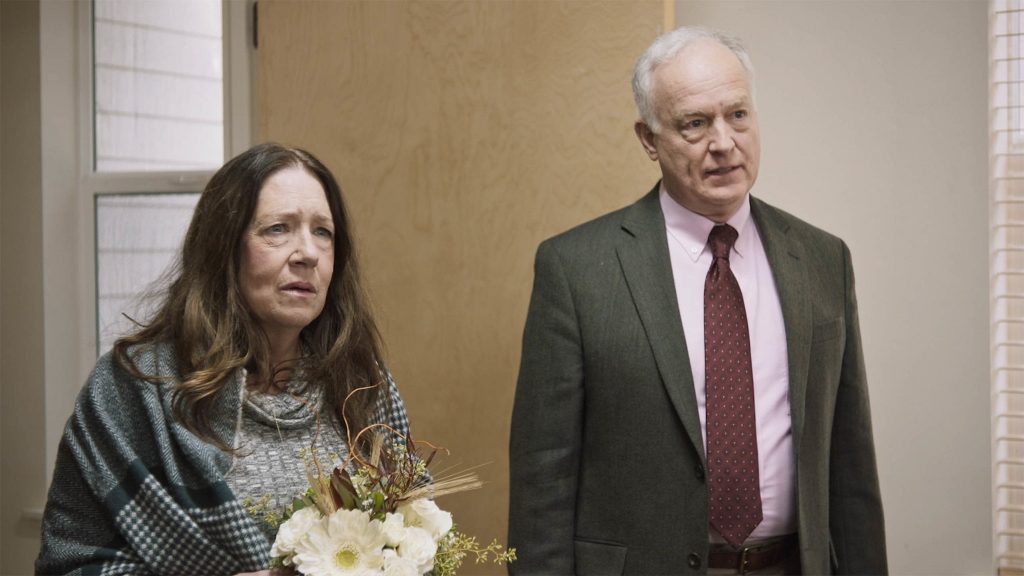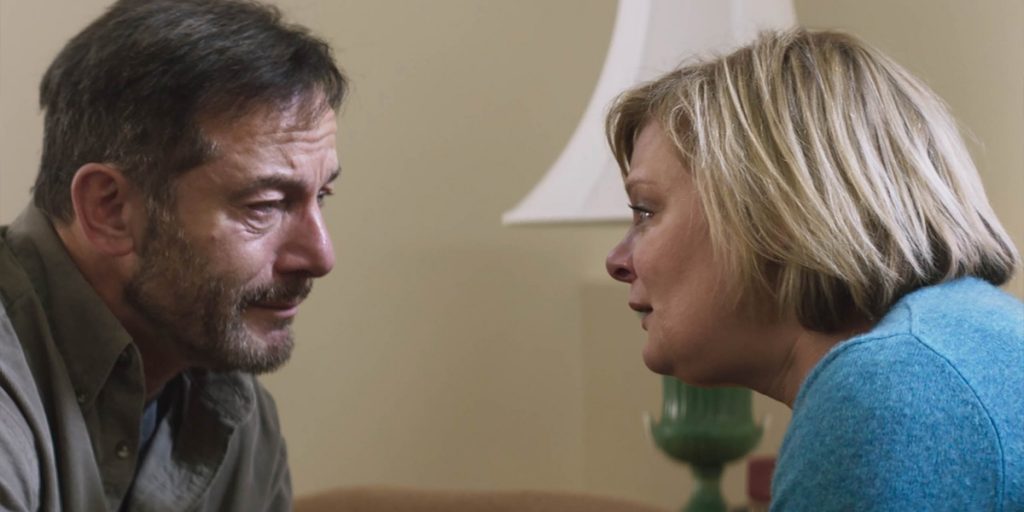Mass showcases four stupendous performances as the parents of a victim and of the perpetrator of a school shooting sit down for a conversation.
Mass tells the story of the meeting between two families forced together by tragedy. Some years earlier, the son of one pair of parents (Ann Dowd and Reed Birney) was the perpetrator of a school shooting that took the life of the son of another pair of parents (Jason Isaacs and Martha Plimpton). The two sets of fractured families have agreed – through the lawyers, of course – to have a sit down meeting that will ideally help both families to gain some small measure of peace.
Candidly, it’s heavy material, made even more weighty by the humane writing and direction of Fran Kranz. Kranz, a nerd culture fan favorite from Joss Whedon projects like Dollhouse and The Cabin in the Woods, shows a remarkably confident hand tackling such material for a first project. He explained in the Q&A that, as a new father at the time, he was deeply disturbed by the shooting at Parkland. This film was the result of that emotional grappling.
I’ll certainly admit that, as the father of two young American children, the fear of some sort of school shooting is staggering. I’m not sure this film would have impacted as deeply as it did before I had children. Kranz is so instantly savvy at how parents grapple with the responsibility for their children and shows a master’s grasp of crafting believably textured people. It’s easy to make political allegories out of the film about the need to converse with people across the aisle, and they hold up, but I think pushing the story into the realm of allegory actually serves to undercut the delicate savvy of the primary narrative.

One of the things Kranz does wonderfully is set the stage. There’s almost the feel of setting up an arena for combat, as a pair of church volunteers and a mediator set up the room where the couple will meet. Kranz synthesizes his directorial style to reflect the evolution of the emotion of the conversation. As the characters arrive at the Episcopal church that will serve as their acting octagon, he uses static cameras reflecting the repressed emotions of the characters. Forced pleasantries are met with a detached, unmoving camera. Slowly but surely, as the conversation picks up in intensity, the camera begins to move more. Formalistic set shots are gradually replaced by handheld, intimate ones. As our characters emotional states become more frayed, the camera becomes shakier. Kranz never lets the camera’s movement stand in the way of capturing his performers, but it’s a wonderfully immersive effect and shows a savvy grasp of tone.
Of course, any first-time director would be blessed to have a cast like this doing some of the best work of their careers. Reed Birney (House of Cards)has the least showy role as the most conservative – both emotionally and politically – of the foursome. Yet his slight emotional removal from the dialogue feels precisely on point for the character. Martha Plimpton (The Good Wife) plays a mother who is both deeply hostile to the dialogue, but also most committed to learning about his son’s murderer. They are both truly superb.
The standouts for me, though, are Ann Dowd (The Leftovers) and Jason Isaacs (the Harry Potter series). Dowd’s commitment to this role is astonishing. From the moment she walks on the screen, even when she’s defending the memory of her son, she looks like she carries the weight of every kid murdered by her son. The actress is known for playing powerhouse domineering roles like in The Handmaid’s Tale or Hereditary, and it’s a remarkable transformation to see her physically shift her very presence like this. She seems on the verge of being overwhelmed by emotion in nearly every moment – it’s truly a wonderful performance. Jason Isaacs is a startling presence here. It’s a role that requires the actor to keep his emotions just beneath the surface at a slowly increasing simmer. It’s inevitable that tensions will raise, and, when Isaac hits a boil, it’s a deeply human and empathetic moment of grief.
Mass is a hard movie for me to recommend. It’s an absolutely enervating and emotionally withering film to sit through, but it houses a series of remarkable performances. More than that, it tells a uniquely human story of conflict and connection.
Mass premiered digitally at the Sundance Film Festival on January 30, 2021. The film was released in US theaters by Bleecker Street from October 8, 2021.

